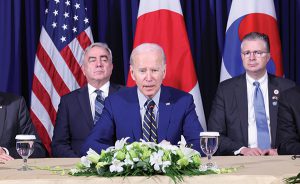Bloomberg
President Joe Biden met the leaders of Japan and South Korea to rally support in the face of increasingly brazen North Korean missile tests, a show of solidarity a day before he meets Chinese President Xi Jinping.
Biden met on Sunday with Japanese Prime Minister Fumio Kishida and South Korean President Yoon Suk Yeol during a summit in Phnom Penh, Cambodia. He rattled off a series of discussion points while putting particular emphasis on Pyongyang’s threats.
“For years, our countries have been engaged in a trilateral cooperation out of a shared concern for the nuclear and missile threats North Korea poses to our people,†Biden said. North Korea continues “provocative behavior†and the partnership is more important than ever, he added.
Biden last met Kishida and Yoon in June on the sidelines of the NATO summit. Since then, the pace of missile tests has heightened tensions in the region and put fresh pressure on the trio to maintain a show of unity, even as bilateral relations between Japan and South Korea remain frosty.
“North Korea’s provocations, unprecedented both in their frequency and manner, continue and we assume more could be coming,†Kishida said.
Biden said the three leaders would also discuss other efforts, including how to “strengthen our supply chains†and build “economic resilience,†a nod to simmering tensions over US policies on semiconductor chips. Both South Korea and Japan, home to some of the world’s biggest carmakers, have also opposed US aid for local electric-vehicle manufacturers in the Inflation Reduction Act.
The requirements of the electric vehicles tax credit are “not consistent†with the US and Japan’s shared policy to work with allies and like-minded partners to build supply chains, the Japanese government has said. South Korea is home to three of the world’s largest EV battery manufacturers, which announced $25 billion in US investment since Biden took office. Yoon’s government and South Korean car companies have been lobbying for changes.
In a separate one-on-one meeting with Yoon, Biden said he will consider the contributions of South Korean companies to US battery and electric-vehicle industries when implementing the new law, according to a statement from the presidential office in Seoul.
South Korea and Japan have also found themselves caught between their biggest trade partner, China, and their top security partner, the US, over Biden’s move to tighten controls on exports of some chips and chipmaking equipment to China.
South Korea’s SK Hynix Inc., one of the world’s biggest memory chip makers, has warned the Biden administration’s escalating restrictions could force the closure or sale of a major plant in China, an “extreme situation†it hopes to avert.
The US president said the three leaders would also discuss concerns about China, including how to “preserve peace and stability across the Taiwan Strait†and work toward “the common goals of a free and open Indo-Pacific.†Biden and Xi are due to meet Monday in Bali, Indonesia, ahead of the Group of 20 summit.
Pyongyang has shown its anger over joint military drills between the US allies by firing off an unprecedented barrage of missiles in the past few weeks. They have included his newest nuclear-capable rockets designed to hit targets in South Korea and Japan, as well as the test of a long-range missile designed to reach the US.
 The Gulf Time Newspaper One of the finest business newspapers in the UAE brought to you by our professional writers and editors.
The Gulf Time Newspaper One of the finest business newspapers in the UAE brought to you by our professional writers and editors.
